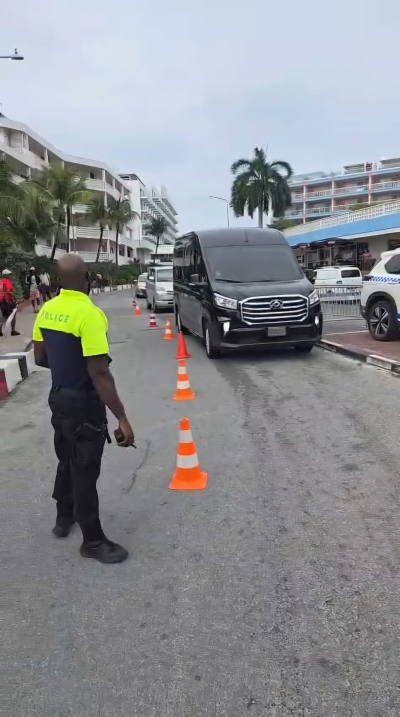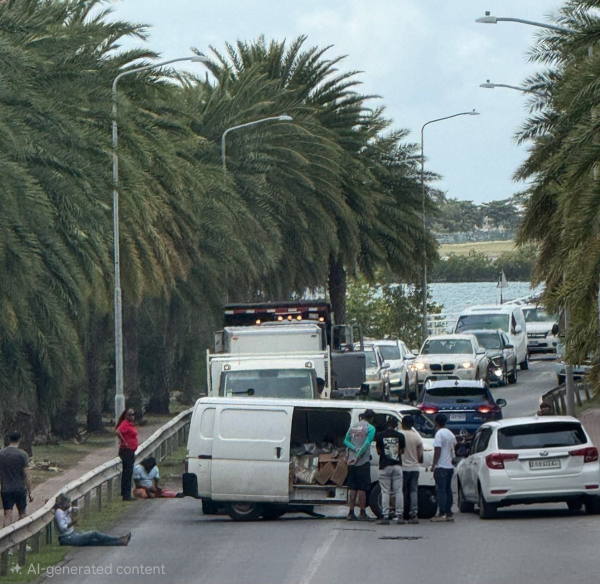 PHILIPSBURG:--- The Police Force of Sint Maarten (KPSM) advises the public that persistent and ongoing illegal parking along Rhine Road in the Maho area and at the entrance of Beacon Hill Road has forced the police to take decisive enforcement action. Despite repeated complaints, warnings, and preventive measures implemented over an extended period, traffic violations at this location have persisted, creating serious disruptions to traffic flow and posing risks to road users and pedestrians.
PHILIPSBURG:--- The Police Force of Sint Maarten (KPSM) advises the public that persistent and ongoing illegal parking along Rhine Road in the Maho area and at the entrance of Beacon Hill Road has forced the police to take decisive enforcement action. Despite repeated complaints, warnings, and preventive measures implemented over an extended period, traffic violations at this location have persisted, creating serious disruptions to traffic flow and posing risks to road users and pedestrians.
Over the past several weeks, KPSM has received multiple requests and complaints regarding illegal parking along Rhine Road leading into the Maho area, as well as at the entrance of Beacon Hill Road. Community officers assigned to the Maho area have, over time, implemented several measures to discourage drivers from parking on sidewalks.
In collaboration with concerned parents and community members, concrete dividers were placed to prevent vehicles from parking on pedestrian walkways. However, drivers have adjusted their behavior and have begun parking on the roadway itself. This has narrowed the entrance to Beacon Hill Road and the roundabout leading into Maho, significantly affecting traffic flow in this heavily used area.
As the preventive measures proved ineffective, KPSM transitioned to active enforcement. On Tuesday, February 3rd, 2026, police officers conducted enforcement at the location, during which fines were issued, and several vehicles were towed for traffic violations. These actions were taken in accordance with the clearly posted no-stopping/no-parking signs present in the area.
KPSM strongly urges residents, tour operators (including large and small buses), ATV rental companies, and visitors to refrain from parking along Rhine Road in Maho and at the entrance of Beacon Hill Road. Illegal parking in these locations continues to obstruct traffic flow and compromise public safety.
Due to continued non-compliance, the police are forced to divert personnel from already limited operational resources to address this behavior—resources that could otherwise be deployed to manage other critical policing duties.
KPSM calls on all road users to cooperate and comply with traffic regulations to ensure a safe, orderly, and accessible traffic environment in the Maho area.
KPSM Press Release.
 PHILIPSBURG:--- The recent confirmation that the Soul Beach Music Festival has officially relocated to Curaçao for its 2026 edition has sparked renewed calls for financial accountability from Member of Parliament (MP) Egbert Doran. While the festival’s departure follows a “homecoming” year in St. Maarten, the MP is raising concerns that the move leaves behind more questions than answers regarding the management of public funds.
PHILIPSBURG:--- The recent confirmation that the Soul Beach Music Festival has officially relocated to Curaçao for its 2026 edition has sparked renewed calls for financial accountability from Member of Parliament (MP) Egbert Doran. While the festival’s departure follows a “homecoming” year in St. Maarten, the MP is raising concerns that the move leaves behind more questions than answers regarding the management of public funds. PHILIPSBURG:--- The Police Force of Sint Maarten (KPSM) is investigating a serious traffic accident that occurred on the Causeway on February 4th, 2026, just before 2:00 p.m.
PHILIPSBURG:--- The Police Force of Sint Maarten (KPSM) is investigating a serious traffic accident that occurred on the Causeway on February 4th, 2026, just before 2:00 p.m.